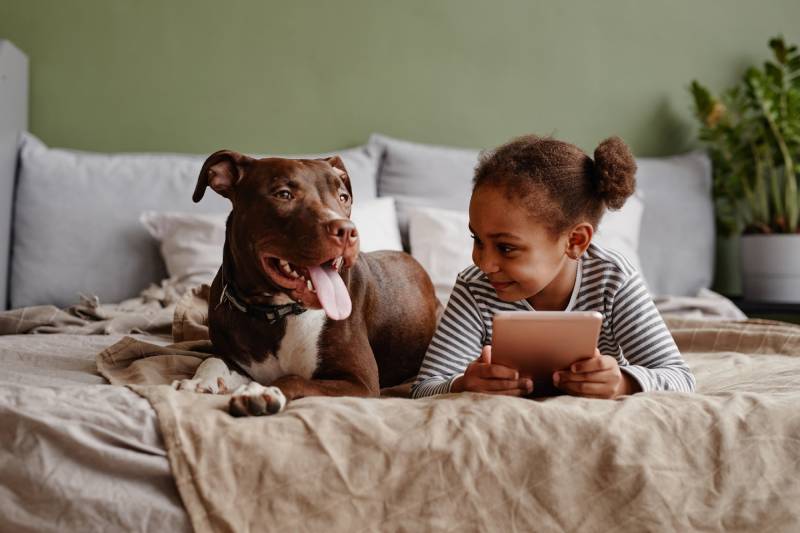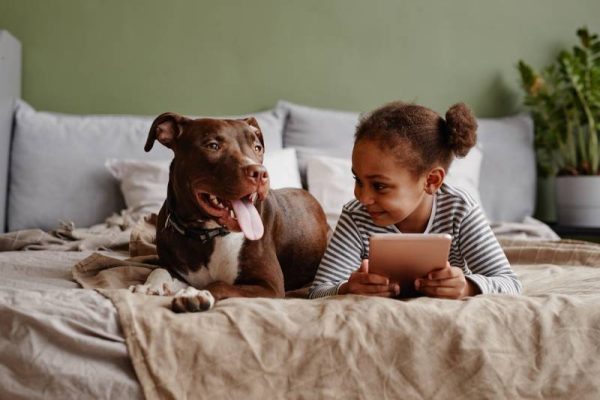Pitbulls have gotten a bad rap for being overly aggressive and temperamental dogs but saying that all Pitbulls are raging beasts is far from the truth.
When secure in a comfortable environment, Pitbulls are docile canines who love to play and socialize with humans and other dogs. No wonder they’re so popular, accounting for 20% of the country’s dog population.1
That said, most parents are still uncomfortable with leaving their children alone with their pet Pitbulls. This apprehension is justified, given the countless tales of Pitbulls killing and maiming dozens of people across the US.
So, should you leave your Pitbull alone with children, and how do these ferocious pups relate to toddlers? Keep reading to find out.
About Pitbulls
The Pitbull is a medium-sized, muscular dog that traces its roots to 19th-century Scotland, England, and Ireland. Pitbulls were first bred in England and Scotland as entertainment animals for bull baiting hence the name Pitbull. Bull baiting is a sport that involves tying a bull to an iron stake, allowing it a 30-meter radius of movement. A handler would then enrage the bull by blowing pepper at its nose. After this, they would free the Pitbulls to kill or maim the bull.
Unsurprisingly, bull baiting was outlawed, which saw Pitbulls become farm dogs that later moved inside into homes and became household pets. Fast forward to today, and there are about 4.5 million Pitbulls in the US,2 with figures showing an upward trajectory.
This includes more than 20 other unique dog breeds besides the American Pitbull Terrier and even more mixed-breed dogs that qualify as Pitbulls. We’ll use the American Pitbull Terrier as our reference standard for our case.
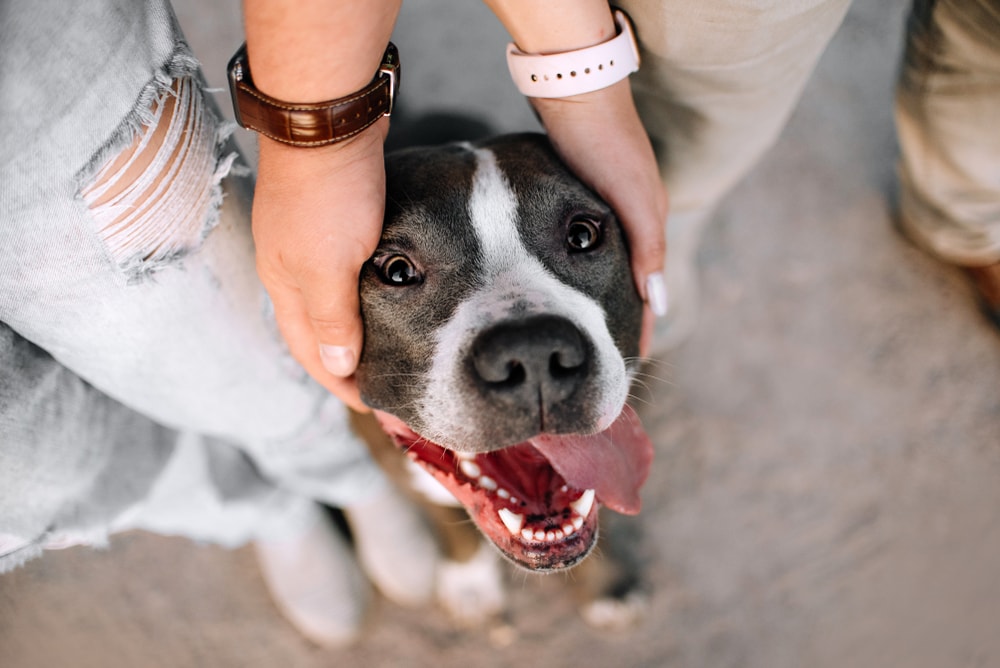
Does the AKC Recognize All Pitbulls?
Contrary to popular thought, the Pitbull isn’t a dog breed but a type of dog and is thus not recognized by the American Kennel Club (AKC).
Pitbull refers to any dog with a muscular build and broad head, typically a mix of different breeds. Aside from the American Pitbull Terrier, other dog breeds recognized as Pitbulls include:
- Staffordshire Bull Terrier
- American Staffordshire Terrier
- American Bully
- American Pitbull Terrier
The AKC only recognizes the Staffordshire Bull Terrier and the American Staffordshire Terrier.
Are Pitbulls Dangerous?
For many years, Pitbulls served as gentle and obedient farm dogs that helped with herding, guarded homes, and participated in hunting. However, some people found that keeping these canines as farm dogs wasn’t making the most of their large and powerful build. These people trained Pitbulls to be violent and aggressive, forever tainting their reputation.
So, are Pitbulls really dangerous?
Yes and no, depending on how the dog in question was raised. Pitbulls are typically calm, gentle dogs that wouldn’t put their paws on a grown person, let alone a child.
However, Pitbulls raised in violent and harsh environments may show aggression when provoked. However, this isn’t different from any other dog. Even Schnauzers can turn violent when brought up in a violent environment.
Pitbulls raised in happy families surrounded by loving and caring people grow up to be gentle and loving animals. However, they might still act aggressively towards anything or anyone they perceive as threatening the family’s safety.
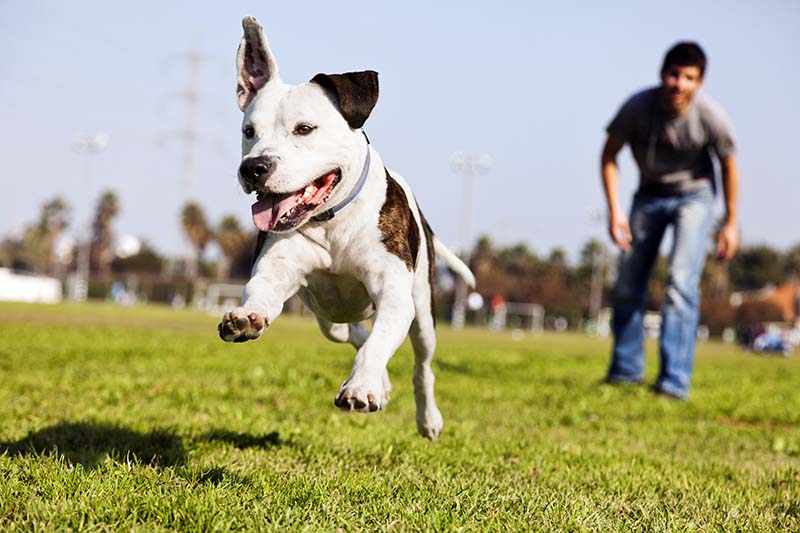
Pitbulls and Kids
Pitbulls are loving and affectionate to kids, but only if you socialize them early enough. Start socializing your Pittie the moment you adopt it. Introduce it to the kids so they can learn to be comfortable around each other and eventually play with each other.
Socializing your Pitbull means allowing short periods of interaction between the kids and your Pitbull. Allow it to play with your kids, but always be on the lookout for any rough play or signs of aggression. Discourage any aggression or rough play before it gets out of hand. Also, teach your children the right way to play with the pup.
Don’t allow any rough tugging, pinching, or hitting that may provoke the Pitbull.
Most importantly, always supervise play for the first few months. Think of this as a training period where you train your kids and Pitbull on how to play appropriately. You’ll be more comfortable leaving your dog to play alone with the kids after this period elapses.
Pitbulls and Babies
While Pitbulls are great with kids, how well do they fair with babies? Do they even recognize babies, or are they indifferent to them?
Pitbulls aren’t inherently dangerous to babies and will never intentionally hurt them. However, like with kids, it’s vital to socialize your dog early enough to understand how they should interact with babies. That way, you’ll be comfortable leaving these canines alone with your baby.
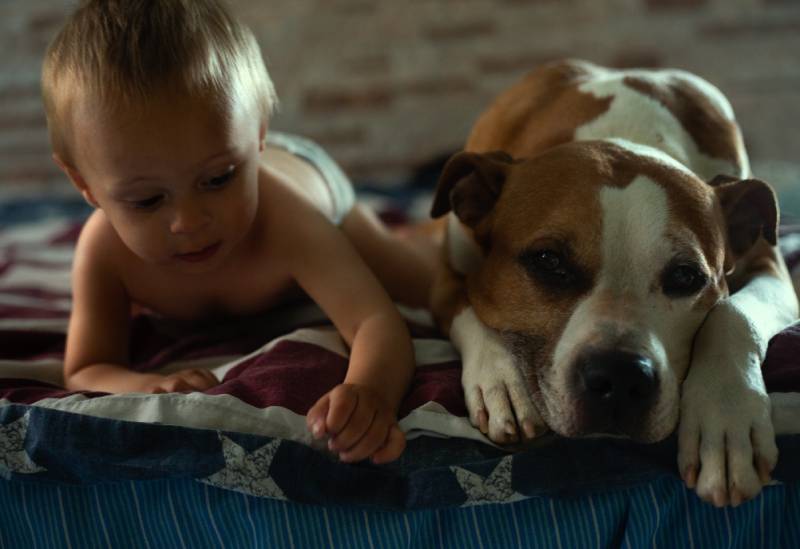
Can Pitbulls Get Jealous of Babies?
As ridiculous as it sounds, Pitbulls get jealous of babies, but not all of them. Dogs can get possessive, and it doesn’t sit well with them when you spend too much time with your baby instead of them.
- Signs of aggression like snarling, growling, or barking when close to the baby
- Avoidance when you carry the baby close to it
- Change in appetite characterized by overeating or only eating a little food
- Excessive grooming and licking when the baby is around
- Signs of depression, like a sudden loss of interest and sleeping all the time
Noticing signs of jealousy in your Pitbull doesn’t mean it threatens your baby’s safety or that Pitbulls are not a good fit for families with babies.
It just means you must be more innovative in managing the time between your baby and your pup. Play with your dog whenever your baby naps to show that you still care for them.
Why Are People Scared of Pitbulls?
If Pitbulls are so friendly and gentle, why are so many people scared of them? Well, a couple of reasons could explain the general fear of Pitbulls. Some of them include:
Pitbull Attack Incidences
Pitbull bites account for 22.5% of all dog bites in the country,3 making them the dog type with the most attack incidence. The frequency of Pitbull attacks and bites has made them synonymous with danger and dog aggression.
It’s no wonder people often associate these gentle beasts with violence and aggression.
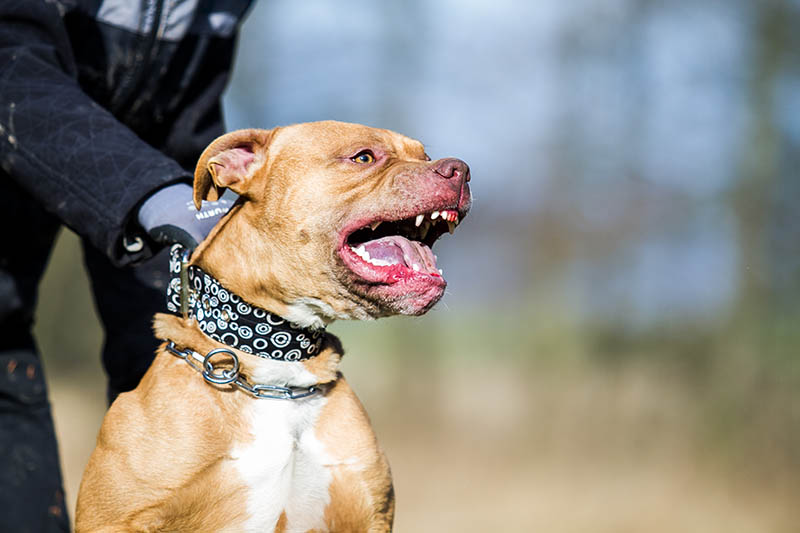
Strong Bite Force
Pitbulls have a bite force of about 235 PSI. To put it into perspective, this is enough to puncture your skin and leave a large wound. This strong bite is another reason why these canines are feared creatures often linked to danger and vicious attacks.
They Are Used in Dog Fights
Pitbulls were originally bred to “bait” bulls, meaning they were often abused and starved to make them aggressive. They also have muscular bodies, making them powerful. Their proficiency at dog fights and other violent sports has made them a name to reckon with. It would be unfortunate were you to go head-to-head with one of these ferocious beasts in a fighting pit.
Conclusion
Pitbulls are good with kids, but only if you raise them to be friendly and amicable. Remember to socialize your dog the moment it sets foot inside your home.
Also, teach your dog to read children’s cues to ensure they’re always on the same page with your kids. If your Pitbull proves stubborn, then you might want to keep it away from the kids until they learn the ropes. An animal behaviorist can also come in handy.
Featured Image Credit: SeventyFour, Shutterstock

